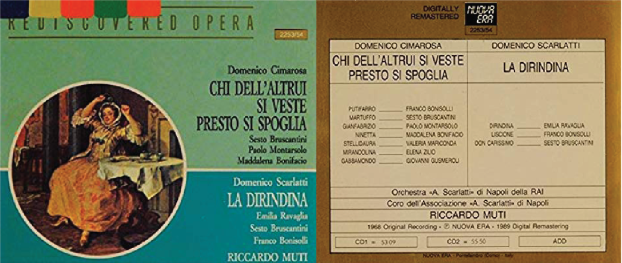An interesting little operatic vignette takes to the stage this month thanks to Northern Ireland Opera Studio, ‘La Dirindina’ by Domenico Scarlatti. The opera studio is a program to encourage young and emerging operatic talent by offering them experience in both staged productions and recitals. A pathway to performance for the future of opera in Ireland.

Domenico Scarlatti and Giovanni Battista Martini.
La Dirindina is a comic intermezzo composed as incidental entertainment to be performed during the interval of Scarlatti’s opera ‘Ambleto’. Shortly before it’s premiere for the 1715 Carnival at the Teatro Capranica in Rome it was withdrawn after being banned by the Vatican censor. The issue seems to have been the rather scandalous libretto by esteemed but irreverent and satirical Tuscan playwright Girolamo Gigli. Printing of the libretto was forbidden but a copy was discovered by Giovanni Battista Martini (famous as a teacher of both J.C. Bach and Mozart) and he seems to have also contributed substantially to the music of the version performed today. The work was more recently rediscovered and edited by musicologist Francesco Degrada and a first recording was conducted by Riccardo Muti in Naples in 1968. It consists of eight recitatives and eight arias or trios.

The first recording of ‘La Dirindina’ conducted by Riccardo Muti in 1968.
A satirical observation on contemporary musical and operatic life La Dirindina tells of the aspiring operatic singer of the title who is being tutored by the older Don Carissimo who seems more interested in his pupils physical attributes than her artistic ones. Needless to say, being an opera, an amorous young upstart in the form of Liscione arrives to thwart Don Carissimo’s plans. Dirindina is in love with Liscione (An operatic love triangle..!). Don Carissimo is vexed by the arrival of Liscione but even more so by the fact that he brings an invitation for Dirindina to perform at an opera house in Milan. Don Carissimo insists she is not ready but Liscione tells her to be successful doesn’t only depend on singing skills and proceeds to teach her how to use her womanly charms to progress in the music business (shock, horror!). He tutors her in a scene from Dido & Aeneas where Dido berates Aeneas for deserting her and for his unfaithfulness. The eavesdropping Don Carissimo thinks the acted scene is real and that Dirindina is about to commit suicide. When he sees it was only acting he is relieved to the point of blessing the young lovers, congratulating them and wishing them all the best to the amusement of both Dirindina and Liscione.
Domenico Scarlatti who was son of the more famous operatic composer Alessandro Scarlatti is best remembered for his many keyboard sonatas and didn’t wander too often into the realm of composition for voice. That being said, this is a delightful if short piece of baroque fun and frivolity which is partly remembered for the scandal of it’s banning. Nonetheless La Dirindina contains some beautiful singing with each performer getting their time under the spotlight.
The Northern Ireland Opera Studio production features counter tenor Francesco Giusti as Dirindina, Rebecca Murphy as Liscione and Christopher Cull as Don Carissimo.

Details of the Northern Ireland Opera Studio production are Here




